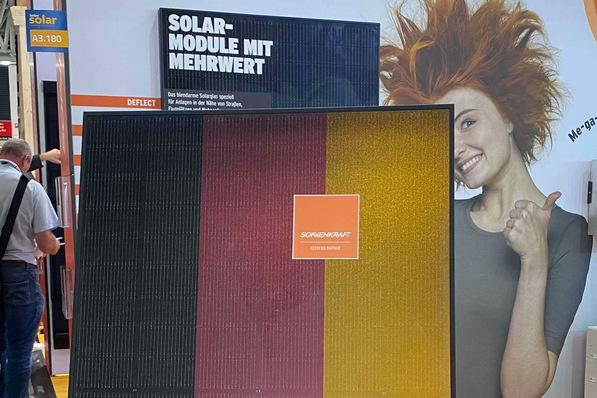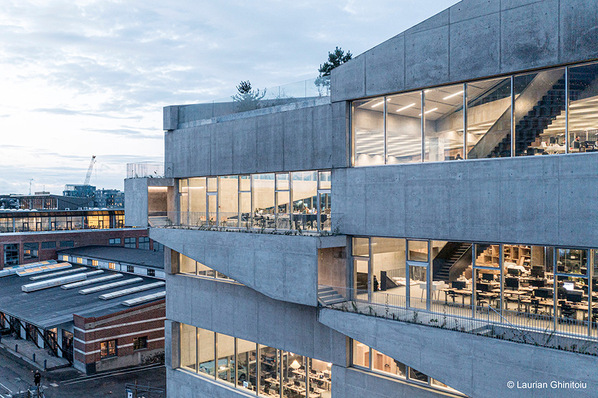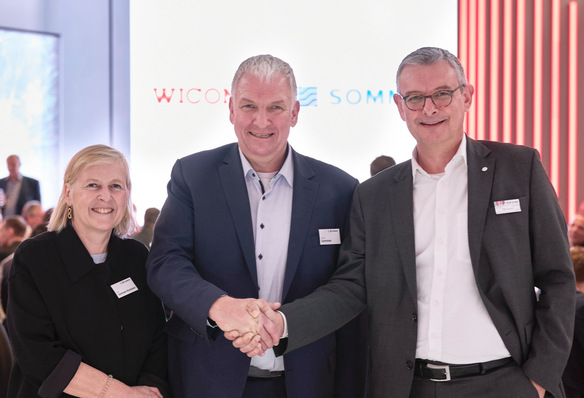A new energy-efficient commercial and office high-rise in a unique wood-hybrid construction was built on the site of the former freight station in Tübingen. The seven-storey commercial building "Westspitze" is the showpiece in the new urban quarter of the old freight station, as the energy-efficient building is entirely clad in PV modules on the facades. Over 600 bronze-coloured solar facade modules from Avancis generate electricity with an annual forecast yield of over 50 megawatt hours. This means that almost 30 tonnes of CO2 emissions are saved through the use of solar power.
Design and performance of the modules were decisive
The new high-rise building in wood-hybrid construction was realised by the architects ackermann + raff and under the construction management of pro.b Architekten in Tübingen. The demands placed on the energy-efficient house meant that the decision to use a solar facade on all four outer facades of the Westspitze was made from the outset. "In order to cover the primary energy requirement using solar energy, we were not only looking for high-performance PV modules, but our main focus was above all on the aesthetics and simple installation of the solar facade modules. Neither the cell structure nor the fastening of the facade modules was to be visible, as these determine the style and colour of the entire outer facade of the building," says Andreas Stahl, managing director of pro.b GmbH & Co. KG.
Tübingen is making progress: Building project with exemplary energy efficiency
The operators of the PV system from the Westspitze are the Tübingen municipal utilities, who are pursuing a clear path towards an energy transition. By 2024, 75 per cent of the demand in Tübingen's power grid is to be covered by renewable electricity generation.
See also this article:
Dancing by the river: the American Copper Building in New York
"There is considerable potential in photovoltaics to promote the energy transition on site with much more solar energy generated on and in buildings. New technical possibilities, such as the facade PV system at the Westspitze, are not only interesting prestige projects, but can also make a real contribution to the city's climate protection goals," says Hanno Brühl, Head of the Energy and Innovations Division at Tübingen's public utility company.

Avancis
"We are naturally very pleased and a little proud that we were able to be part of this impressive and pioneering construction project," adds Dr. Lutz Tautenhahn, Head of Sales & Consulting at AVANCIS. "With the requirements for the statutory energy efficiency criteria, we are trying to provide architects, developers and investors with the best possible solar building product. The decisive factors are a well thought-out product design, aesthetics and seamless integration into the building envelope. Solar facades play an important role in the energy transition, because unlike passive cladding, power-generating facade elements make an active contribution to energy requirements and thus change the CO2 footprint of buildings in the long term.
About Avancis
Avancis GmbH develops and produces premium class solar modules based on the copper indium gallium diselenide compound (CIGS modules) "Made in Germany". This innovative technology is developed in the company's own R&D centres in Munich and Torgau, and implemented in the production facilities in Torgau. The Avancis technology goes back to the pioneering work at Arco Solar in the 1980s and has developed into today's thin-film technology via many intermediate stages. The main brands are the SKALA product platform as an energy-generating facade cladding material for buildings and infrastructure facilities and the PowerMax photovoltaic module, which is used in open spaces and rooftop installations. Avancis has been part of the CNBM Group since 2014.













